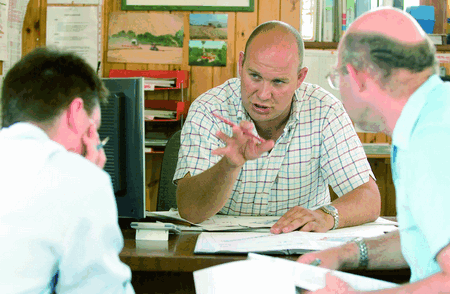Farm managers get 25% salary boost according to Institute of Agricultural Management
Professional farm managers are being increasingly rewarded as employers fight to retain the best individuals, a new survey has revealed.
The Institute of Agricultural Management has published its first survey of farm managers’ pay and conditions for four years, nearly 40 years since the first study.
In 2007, managers received an average salary worth just under £40,000 a year, a rise of 25% since the last survey in 2003 and representing an increase of 6% a year.
Remuneration packagesIn addition to salaries, farm managers in the survey estimated the non-cash benefits they received, such as occupation of a house and use of a vehicle, at £10,194, bringing the average total for remuneration packages to just over £50,000.
Two-thirds of managers surveyed received a fixed salary, with 32% on a salary-plus-bonus arrangement and only a few employed on a profit-sharing basis.
The IAgrM estimated there were about 5000 employed farm managers in the UK, excluding those who were related to the land owner.
But while the headline figures suggest managers may be receiving a generous reward, this should be set against the considerable demands made on them and working hours which would be unheard of in many other industries.

Farm managers
For instance, a Midlands human resources manager with five years post-qualification experience could expect to earn £45,000-65,000 a year for a 37-hour week, while farm managers would be earning significantly less than a London computer services manager, according to figures from international recruitment firm Robert Walters.
Chairman of the IAgrM and Strutt & Parker consultant Will Gemmill said the results of the survey reflected a shortage of good people in agriculture, which was now becoming more apparent.
“Undoubtedly, employers have now to pay more for the right people, and it’s a reflection of supply and demand. Also people nowadays are more likely to move more often in their careers. But it’s people that make successful businesses and the best people are in short supply.”
This helped to reinforce IAgrM’s case for a professional body for agriculture, providing chartered status for professionals, he added.
Managers’ packages
Cheffins’ farm management consultant David Bolton said the £50,000 total was unsurprising. “It is hard to evaluate the value of add-on benefits – how much is a gorgeous house worth, for example?
“But with some rejuvenation of profits in arable the market for the best people has quickened a bit. Our experience is that farm businesses are reviewing managers’ packages. There is definitely activity.”
Farm managers with less autonomy and foremens’ salaries had also improved. Richard King, of consultant Andersons, said the next issue of the ABC farm budgeting and costings book due to be published in May, included a higher figure of £27,200 for such individuals, although this only reflected cash earnings and no other benefits.
Andrew Robinson, who farms 930ha (2300 acres) for a private landowner near Toddington, Bedfordshire, and was a Farm Manager finalist in the 2006 Farmers Weekly Awards, agreed it was encouraging that the profession of farm management was being increasingly valued. “But a farm manager is only ever as good as his staff, and the team working with him is so important.”
He and his employers had chosen to pay staff significantly above Agricultural Wages Board rates to reflect this, he added.
